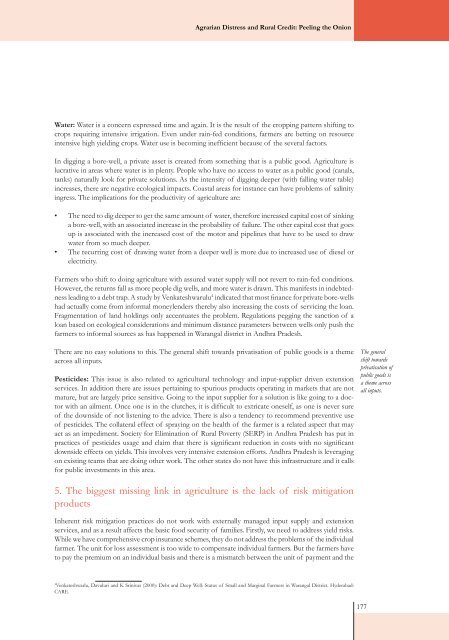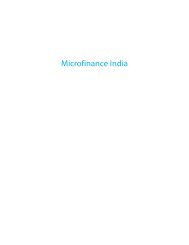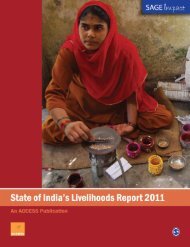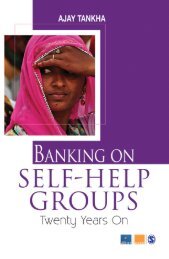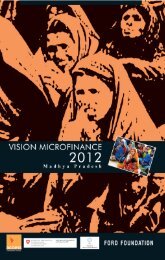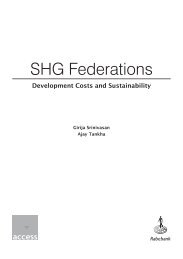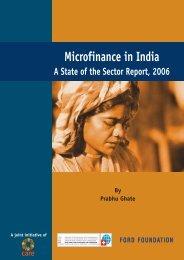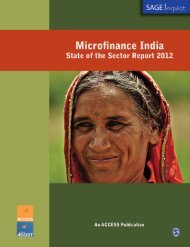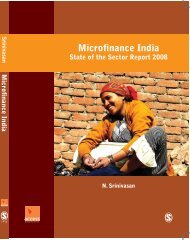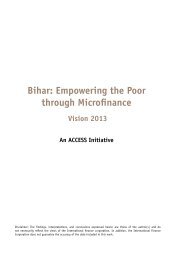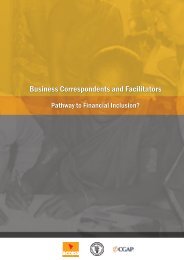SOIL Report 2008 - ACCESS Development Services
SOIL Report 2008 - ACCESS Development Services
SOIL Report 2008 - ACCESS Development Services
You also want an ePaper? Increase the reach of your titles
YUMPU automatically turns print PDFs into web optimized ePapers that Google loves.
Agrarian Distress and Rural Credit: Peeling the OnionWater: Water is a concern expressed time and again. It is the result of the cropping pattern shifting tocrops requiring intensive irrigation. Even under rain-fed conditions, farmers are betting on resourceintensive high yielding crops. Water use is becoming inefficient because of the several factors.In digging a bore-well, a private asset is created from something that is a public good. Agriculture islucrative in areas where water is in plenty. People who have no access to water as a public good (canals,tanks) naturally look for private solutions. As the intensity of digging deeper (with falling water table)increases, there are negative ecological impacts. Coastal areas for instance can have problems of salinityingress. The implications for the productivity of agriculture are:• The need to dig deeper to get the same amount of water, therefore increased capital cost of sinkinga bore-well, with an associated increase in the probability of failure. The other capital cost that goesup is associated with the increased cost of the motor and pipelines that have to be used to drawwater from so much deeper.• The recurring cost of drawing water from a deeper well is more due to increased use of diesel orelectricity.Farmers who shift to doing agriculture with assured water supply will not revert to rain-fed conditions.However, the returns fall as more people dig wells, and more water is drawn. This manifests in indebtednessleading to a debt trap. A study by Venkateshwarulu 4 indicated that most finance for private bore-wellshad actually come from informal moneylenders thereby also increasing the costs of servicing the loan.Fragmentation of land holdings only accentuates the problem. Regulations pegging the sanction of aloan based on ecological considerations and minimum distance parameters between wells only push thefarmers to informal sources as has happened in Warangal district in Andhra Pradesh.There are no easy solutions to this. The general shift towards privatisation of public goods is a themeacross all inputs.Pesticides: This issue is also related to agricultural technology and input-supplier driven extensionservices. In addition there are issues pertaining to spurious products operating in markets that are notmature, but are largely price sensitive. Going to the input supplier for a solution is like going to a doctorwith an ailment. Once one is in the clutches, it is difficult to extricate oneself, as one is never sureof the downside of not listening to the advice. There is also a tendency to recommend preventive useof pesticides. The collateral effect of spraying on the health of the farmer is a related aspect that mayact as an impediment. Society for Elimination of Rural Poverty (SERP) in Andhra Pradesh has put inpractices of pesticides usage and claim that there is significant reduction in costs with no significantdownside effects on yields. This involves very intensive extension efforts. Andhra Pradesh is leveragingon existing teams that are doing other work. The other states do not have this infrastructure and it callsfor public investments in this area.The generalshift towardsprivatisation ofpublic goods isa theme acrossall inputs.5. The biggest missing link in agriculture is the lack of risk mitigationproductsInherent risk mitigation practices do not work with externally managed input supply and extensionservices, and as a result affects the basic food security of families. Firstly, we need to address yield risks.While we have comprehensive crop insurance schemes, they do not address the problems of the individualfarmer. The unit for loss assessment is too wide to compensate individual farmers. But the farmers haveto pay the premium on an individual basis and there is a mismatch between the unit of payment and the4Venkateshwarlu, Davuluri and K Srinivas (2000): Debt and Deep Well: Status of Small and Marginal Farmers in Warangal District. Hyderabad:CARE.177


